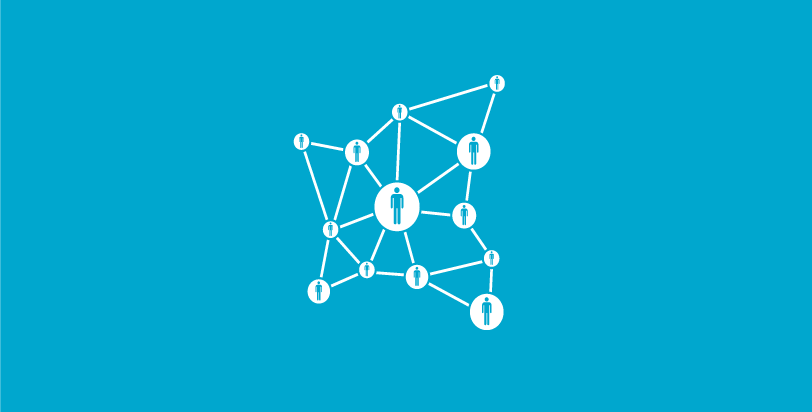As they say, “mend your sails when the weather is fine.” The piece of advice is well appreciated by politicians and political parties trying to win the most of support in the future elections. However, they are not mending their sales, but rather prepare the channels for communication and self-promotion, to inform about their positions and activities.
In Ukraine, during the two election campaigns in 2019, it became obvious that social media turned into a platform to easily and efficiently contact the voters. Since that time, OPORA has been monitoring the promo activities of Ukrainian political actors on the social media such as Facebook. In February and March, we traced the most active group of pages using the political ads tool (Політичні війни, Вільний Донбас, Економічні війни, Все гарно в Україні). They are paying for the promotion of videos on the YouTube channel of Viktor Medvedchuk, an old-timer in Ukrainian politics.
Since recently, the channel has been inaccessible. It was blocked by the YouTube administration for sharing fake messages about the Russian vaccine and the establishment of US biolaboratories on Ukraine’s territory.
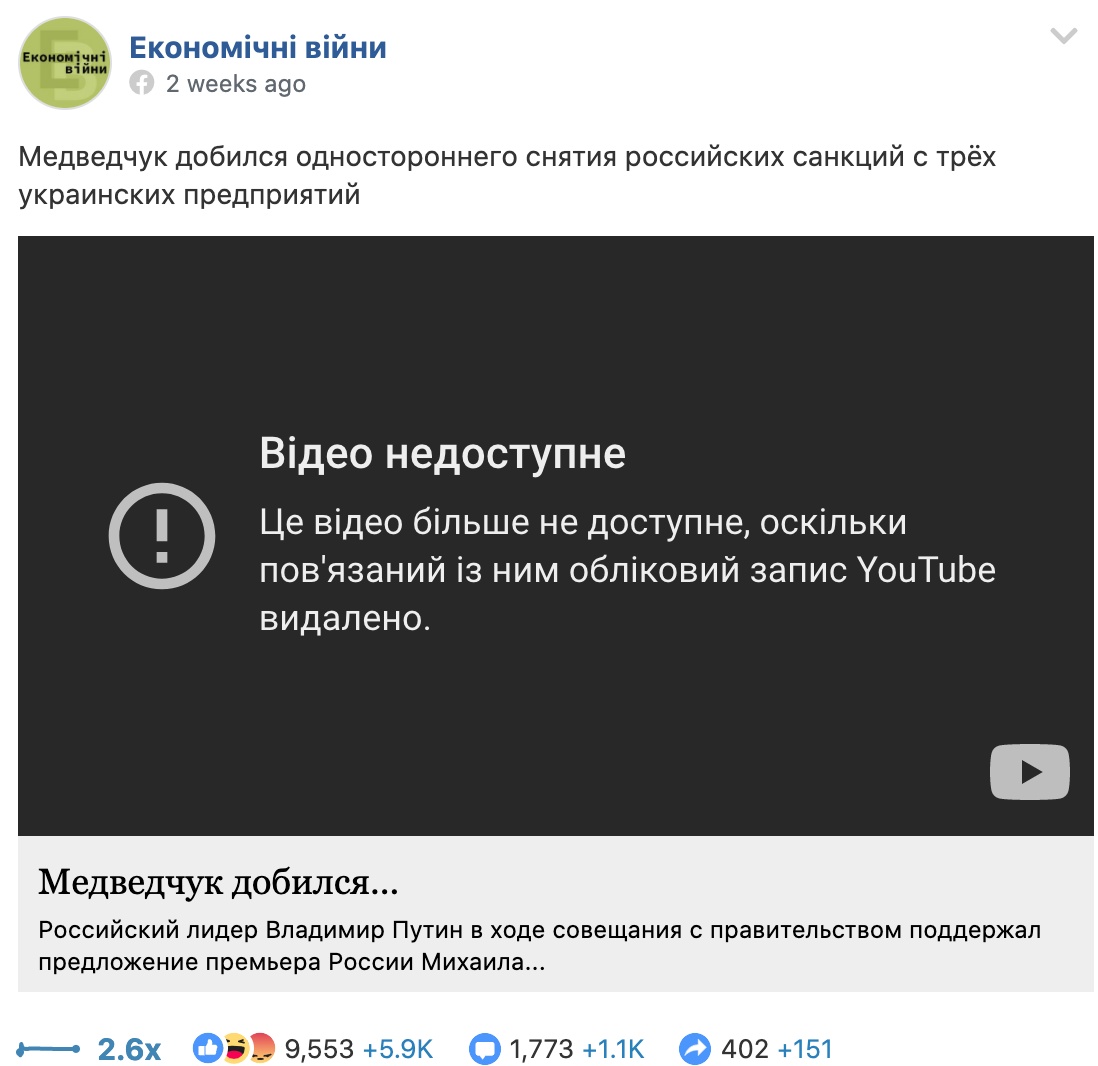
The abovementioned four Facebook pages were active and used a service of political ads also during the 2020 local elections campaign. According to the data of Facebook Ads Library, from September, 5 to October, 23, their expenses for political ads reached almost USD 14,000 (UAH 400,000). The highest ampunts were invested by the pages Політичні війни (4708 $) and Все гарно в Україні (4461 $). Lower amounts were spent by the Економічні війни (2089 $) and Вільний Донбас (2715 $). The posts on the pages were quite expectedly campaigning for the political force where Viktor Medvedchuk is head of political council – the “Opposition Platform – For Life.” The criticism mostly targeted central authorities and the incumbent President Volodymyr Zelensky personally. However, other electoral racers would also get hit sometimes, such as Andriy Palchevskyi, a protagonist of one of the previous texts by OPORA.
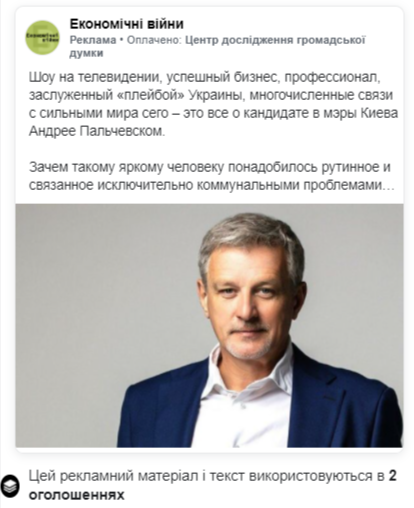
Meanwhile, the same posts were also actively shared by a page named Press Service of Viktor Medvedchuk. The only difference was that the posts were promoted as ads.
Medvedchuk on the Economic Cooperation With Russia
And the “Most Positive News on Developments in Ukraine and Internationally”
Three of the five Facebook pages are part of the “News and Mass Media” group; one of them (Economic Wars) is marked as “Interests” in the profile. The oldest page is Press Service of Viktor Medvedchuk. It was created on February, 21, 2017, and has almost 26,000 likes from users, and over 27,600 followers. The second oldest page is that of Політичні війни (lit. – Political Wars); it was created on November, 16, 2018; and liked by over 12,000 Facebook users. The number of permanent followers keeping track of the updates is 13,500. In fact, the page description says: “Political wars in Ukraine are underway! We don’t promote anyone! We shall show you the real faces of those who are striving for power!” (the quote is shown as in the original – OPORA). The page Все гарно в Україні (lit. – All is Well in Ukraine) was created on December, 17, 2018, and includes the audience of 4,500 followers and has above 4,000 likes. In the page description, administrators claim they will keep the positive mood for their readers: “in Ukraine, you may ask. We can tell you! Read the most positive news about developments in Ukraine and internationally.” The page Вільний Донбас (lit. – A Free Donbass) was created on February, 19, 2019, and has almost 2,800 likes and 2,900 followers. The page’s informational objectives are described as critical, revealing but objective posts about the authorities: “An honest and objective approach towards politics and politicians of the Donbass. We shall lift their masks and show their true faces”. Економічні війни – is the page created on June, 5, 2019; it collected 1,727 likes from Facebook users and 1,890 followers. The description says that the content the followers are going to get will cover business issues: “Economic wars in Ukraine are raging daily! We shall show the true faces and schemes of those who are doing business a-la Ukrainian!” All pages, except for the “Вільний Донбас” and Пресс-служба Виктора Медведчука, are administered from Ukraine, and by one international user, which country of residence is hidden by page managers.
The pages share many features. Below, you can read about the factors that highlight the links between them, and the signs to conclude about their coordinated activities.
The first sign is the identical materials shared by all the five pages in about the same time. For example, the pages Політичні війни, Вільний Донбас, Економічні війни, Все гарно в Україні started posting ads on September, 17, that included videos with comments by Viktor Medvedchuk about peace in Donbass, on local elections in this region, and on other issues. It shall be mentioned that page administrators commented them differently. They inserted different quotes from videos to captions for each ad.
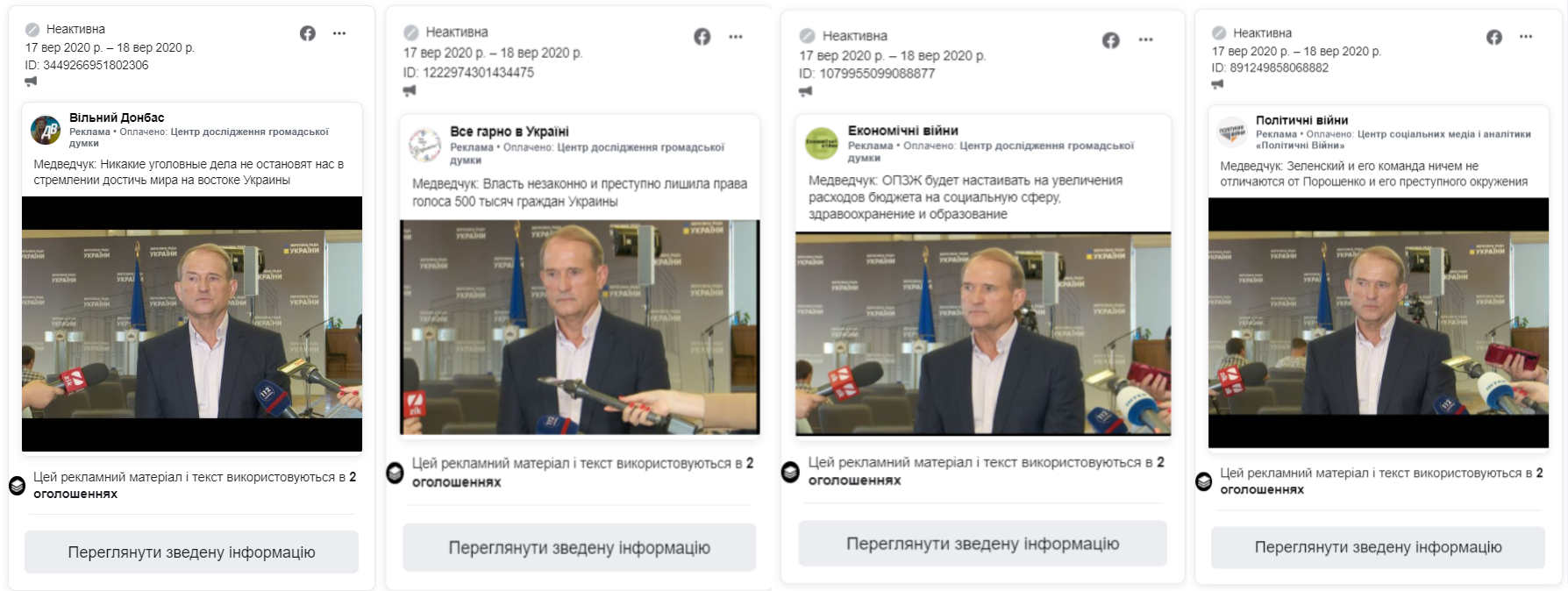
Another illustration is an interview with Viktor Medvedchuk on the NewsOne channel shared by the four pages during the period from October 16 to 22 (or from 17 to 21).
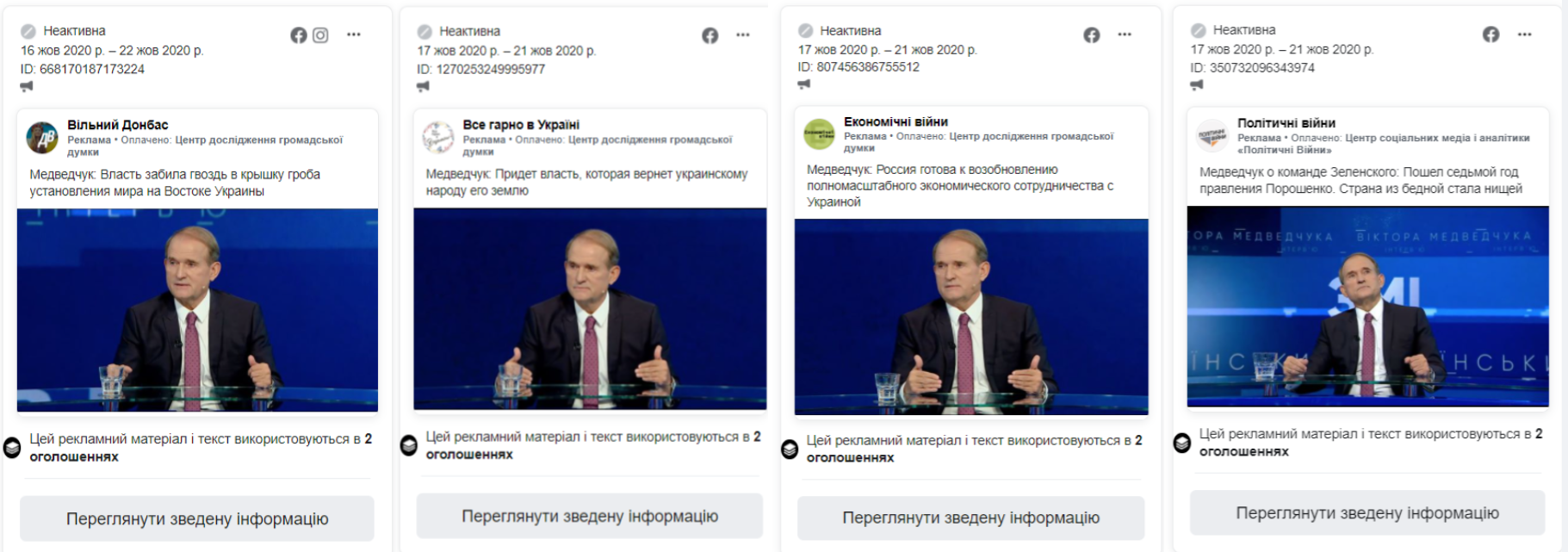
The page Пресс-служба Виктора Медведчука did not share the promoted ads but the post with the same video was published on September, 17 and October, 17:
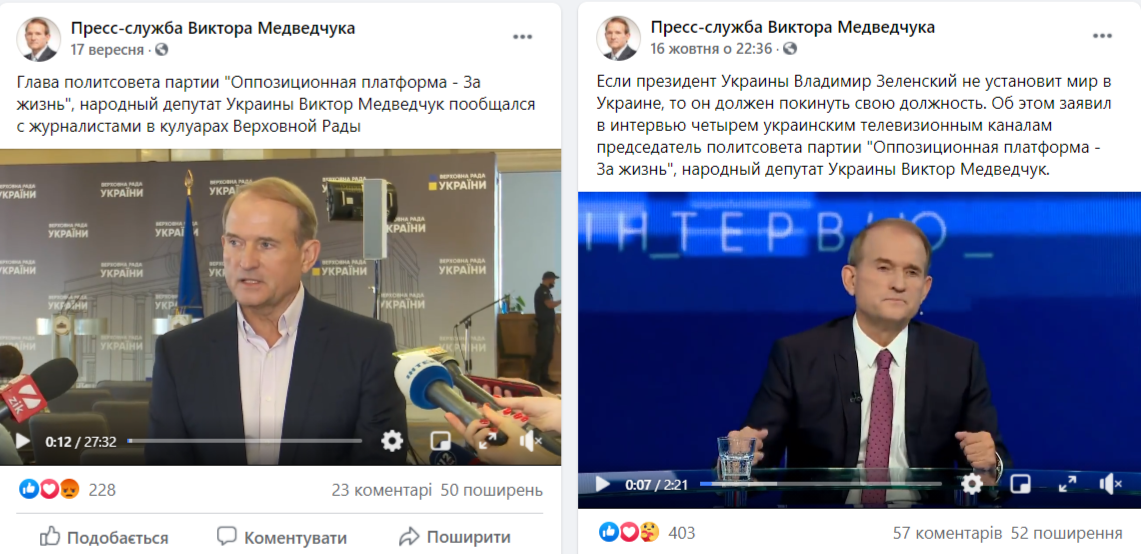
Who pays for the ads?
The second sign is the advertisers that directly paid for the political ads on the pages. Вільний Донбас, Все гарно в Україні and Економічні війни shared ads from the so-called “Center for Public Opinion Research.” They stated the advertiser’s telephone number (+380991611195), email ([email protected]) and website vgvu.com.ua (non-functional). The Center’s address is the city of Kyiv, 26, Panasa Myrnoho Street, office 113 (the address has hosted the Institute of Economy and Forecasting of the NAS of Ukraine for 23 years now). It is indicative that the Google search does not show any information on any “Center for Public Opinion Research.” We only managed to locate one non-governmental organization with a similar name – “Kalininskyi Center for Public Opinion Research” non-governmental organization of Kalininskyi district. According to YouControl and the Ministry of Justice of Ukraine, the NGO was registered in 1998 in Donetsk. After the start of war in the East of Ukraine in 2014, they have not changed their registration, which implies they stayed on the occupied territory.
The ads from the “Політичні війни” page was paid by the Center of Social Media and Analytics “Political Wars.” The only available information about the Center is found on their website. It informs that it is a public association established in 2018 as a non-partisan and research and analysis non-governmental entity. According to the Center’s description on the website, they “conduct monitoring, authentic research and implement programs to foster objective public opinions on a broad range of political, social, and information aspects.” In addition, the website does not have any other data, such as monitoring findings, or research outcomes. The information about the official registration of the public association with this name is not available, either.
One content-plan for all
Having analyzed the activity of five pages over August-October, 2020 on Crowdtangle (an analytical tool for analyzing Facebook environment), we identified posts that showed unusual activity levels. There was an untypically high number of comments, likes, reactions, and reposts. While most posts on the page of Вільний Донбас had under 15 likes for each comment, some posts would sometimes collect over 2,500 likes, and about 600 comments. Oddly enough, but users only pay attention to posts that mention Medvedchuk:
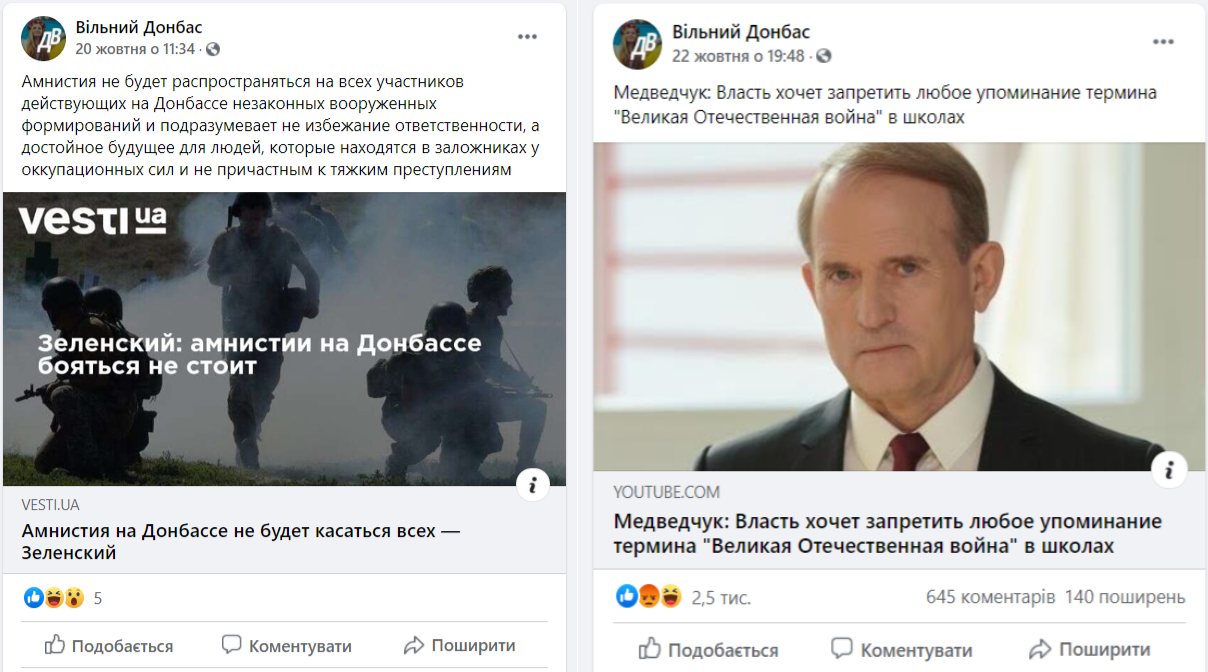
During the period of August-October, on all the five pages, we managed to identify 144 posts that had abnormal activities.

It is notable that the posts on all the five pages went viral on the same days, which is another indicator to a coordinated activity of the network of pages. The graph below shows the days when the Crowdtangle recorded natural activity under the posts (comments, likes, reactions, reposts):
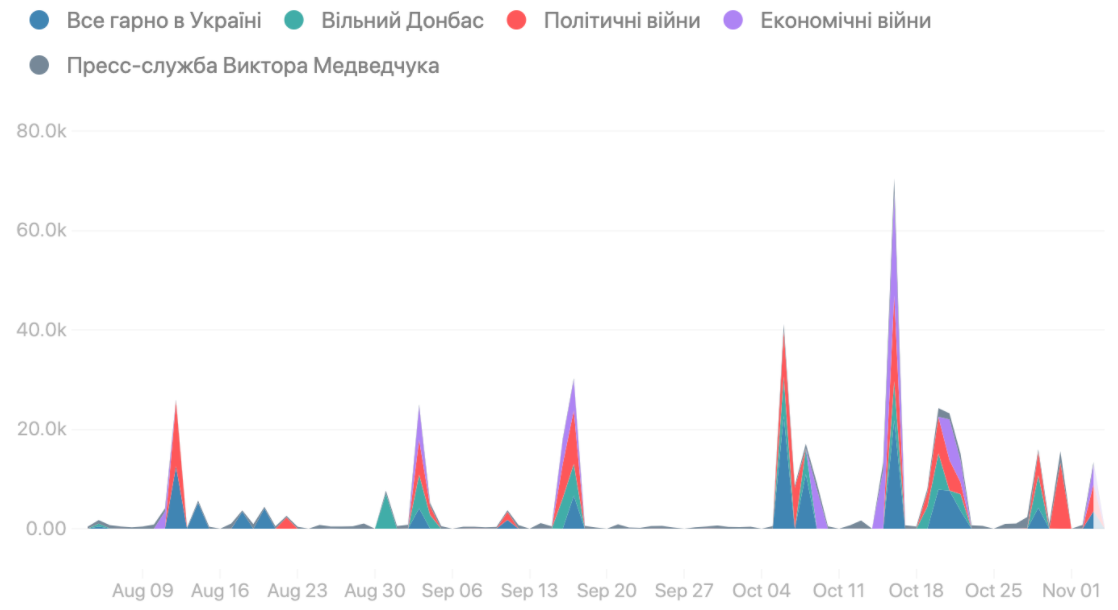
The pages published posts on the same days and were “silent” on the same days, too. The graph below shows the days when each of the five pages published their posts. Similar to the graph above, the time spans overlap:
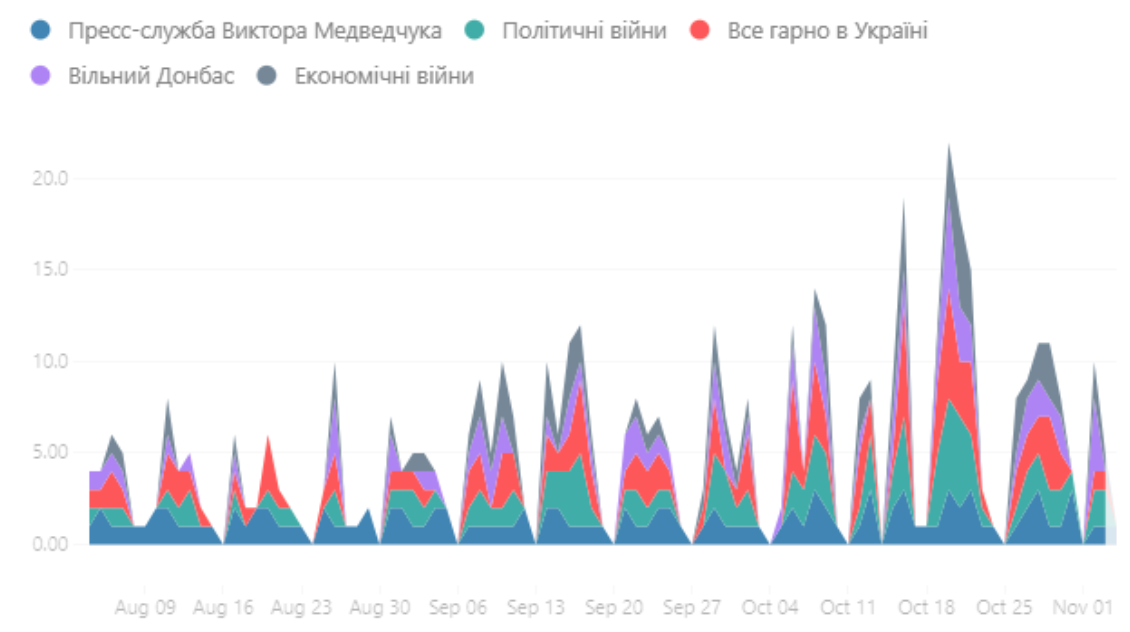
Who creates the activity?
What is the reason behind the popularity of certain posts? The analysis of over 16,000 comments under the 144 viral posts helped us reveal two networks of bots that boosted the artificial activity levels. In the analysis we sampled the accounts that commented posts from at least two pages of five. There were 1,781 users of this category.
One network of bots was approving of activities and positions of Viktor Medvedchuk on various aspects the politician described in videos. Thus, we identified a page by Анатолій Іванов who posted the same comments under different posts on the pages of Економічні війни and Політичні війни, but had only one photo on the profile and zero Facebook friends:
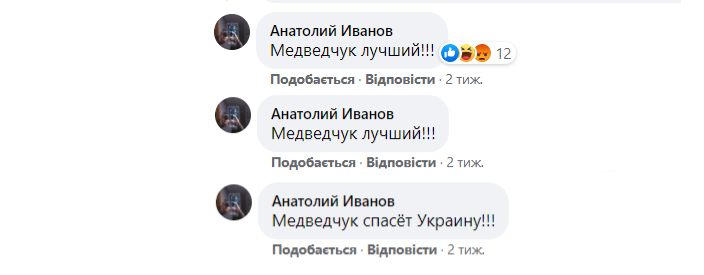
Likewise, Владимир Скобелев, Iveta Lance and Janet Yastrebtseva also showed certain activity on several pages (they posted comments on the pages of Політичні війни, Економічні війни and Вільний Донбас). At the same time, their personal profiles only had few personal photos and no communication with friends.
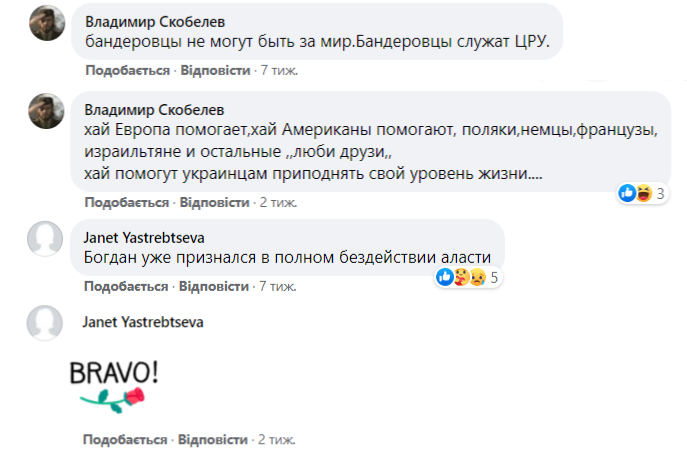
However, another network of bots was much broader and better coordinated. They negatively evaluated activities and positions of Viktor Medvedchuk. We found the pages of Татьяна Кульбеда, Леся Гордийчук and Женя Евгений that did not have any photos in their profiles, never engaged with their Facebook friends, and never had any activities on their own pages.
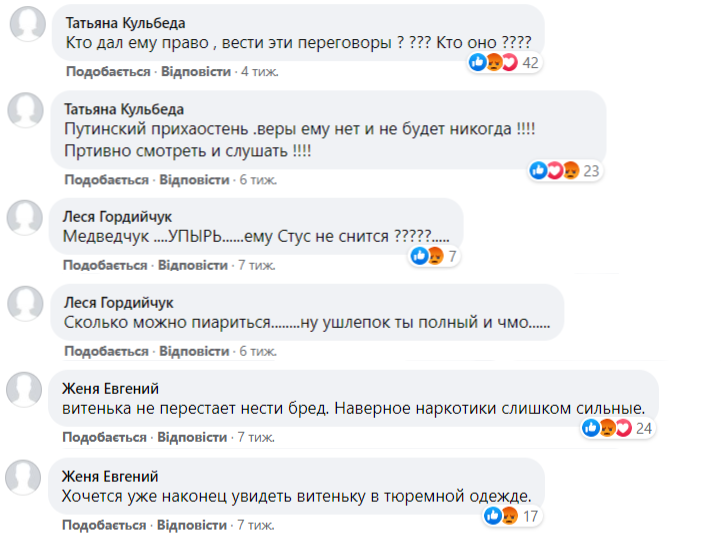
They all posted their comments on the pages of Політичні війни, Економічні війни and Вільний Донбас (except for Татьяна Кульбеда). The comments were rather similar in content and were mostly about Viktor Medvedchuk personally. The bots made a special focus on his personal relations with Vladimir Putin, and expressed doubt about his right to represent a position of Ukrainian society in any negotiations. Besides, they also mentioned his engagement in the court proceedings against Vasyl Stus.

The pages of Ігор Бородавчук and Василь Векерик had a similar pattern with the above-mentioned accounts. In our opinion, other users created artificial activity on the five pages by sharing GIF-images or smileys illustrating their dissatisfaction. For example, Валентина Кирина posted the total of 27 comments, Генрих Птицелов (75 comments) and Лана Лана (10 comments).
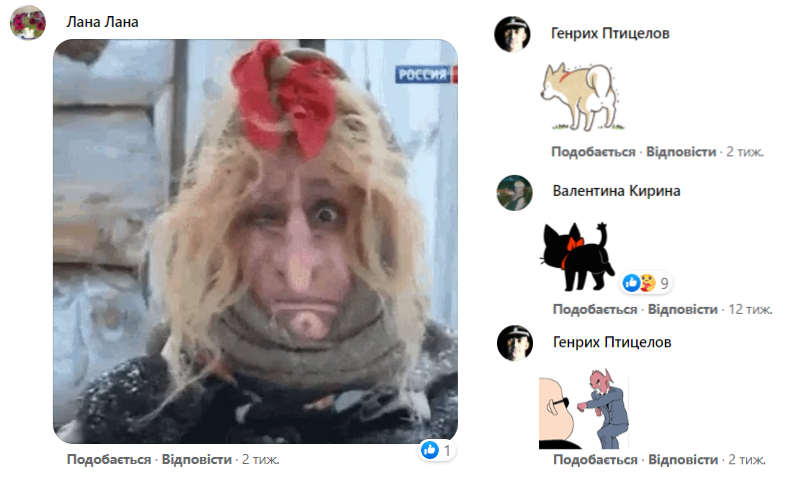
We can see a different tactics on the pages of Roza Way, Люда Кравцова and Наталья Шевченко. They are trying their best to imitate real users: their profiles show many reposts from different Facebook groups or news resources; they also have photographs and Facebook friends. However, comments of the users were not much different from the pages with “blank” profiles.
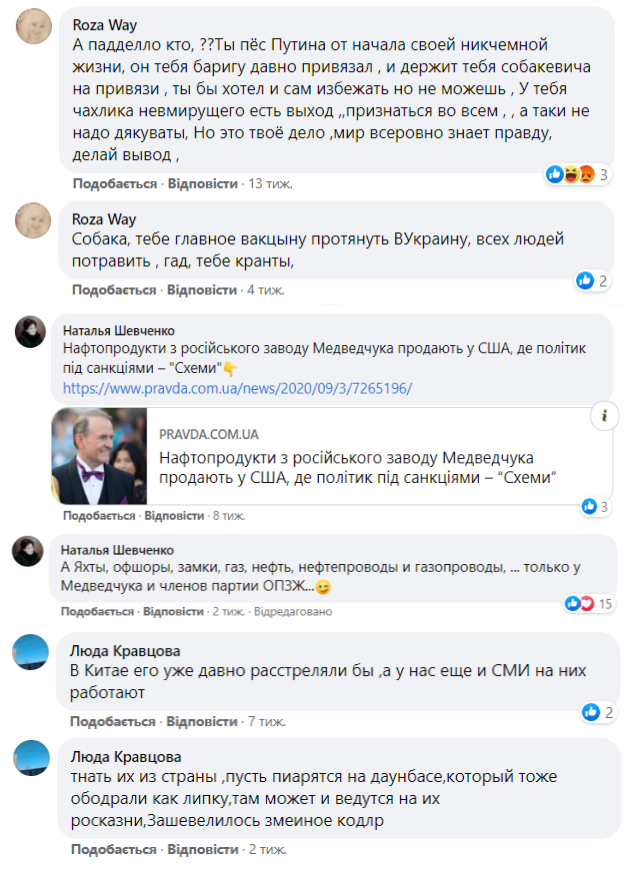
Certainly, not all users leaving comments are the bots. There are also real people who seemed to ardently and genuinely support Viktor Medvedchuk’s position. There were other commenters who had a totally different point of view.
When we compare the above network of bots discrediting Viktor Medvedchuk with the network supporting Andriy Palchevskyi, we can see that the network was much more ramified. Most bots immitated real people, made reposts from various groups, and had several photos. That is why it was more difficult to identify them. We suppose that some of the accounts were the accounts of real people rented to share comments. There is an option to do so, for example, you can use a purchase and sale platform, OLX, to offer your personal account for sale or for rent.
Account rental, the same as the use of bots, is a rather dangerous technique as no one is willing to be in minority. Therefore, the massive information attacks may impact a person’s attitudes to events, political parties or candidates.
Anastasia Romaniuk, Olha Snopok – experts in social media monitoring.
